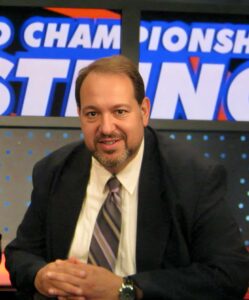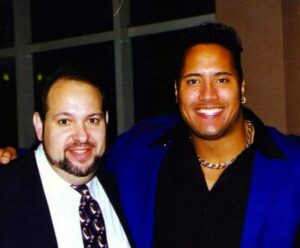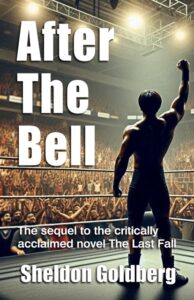By Matt Robinson
Contributing Writer
BOSTON – Shakespeare has often been quoted as opining that, “All the world’s a stage,” and that, during his lifetime, a man “plays many parts.”
For Sheldon Goldberg, this is figuratively as well as literally true given the various stages of his career.

Growing up in Boston’s Mattapan neighborhood as part of a dwindling Jewish community, Goldberg says that he was not wealthy but that, “whatever I didn’t have in possessions, I made up for in imagination.”
Creative pursuits
Drawn to creative pursuits, Goldberg found himself working in the world of broadcasting while still in high school.
“I was recruited to be part of an Explorer program (part of the Boy Scouts) at WNAC, WRKO and WROR,” he recalled. “This really opened up my world and changed my life.”
Getting his first real job as a tour guide at the stations, Goldberg hoped to parlay his time there into a career after graduation. But when he realized how competitive it was in Boston (which is one of the 10 largest media markets in the country), he decided to refocus his creative talents elsewhere.
“My senior year in high school, I interned for a semester at Warner-Elektra-Atlantic Records, which had a local branch in Medford at that time,” he said. “I worked in the mail room and crossed paths with artists, managers and other record industry people. I was very much collecting experiences!”
Even though these experiences did not lead to a job in broadcasting, the friends he had made in media quickly came back into play when Goldberg was asked to handle publicity for a local theatrical company. Combining his contact list with information he garnered from books about public relations, Goldberg soon began to make his mark on the Boston scene in a new way and people began to take notice.
“Soon other local companies gave me jobs,” he explained, remembering how quickly he moved from answering phones at the Wilbur Theater to the Colonial Theater, where he began handling PR for travelling companies and visiting stars, including the legendary Lauren Bacall who was trying out “Woman of the Year” in Boston.
Soon after Bacall bounced to Broadway, Goldberg caught a musical revue at the Boston Repertory Theater.
“It was called ‘The All Night Strut.’” Goldberg recalled. “It was a musical revue of songs from the 30s and 40s. It was a big hit, but when I went with a date to see it, I said to her, ‘This is all my parent’s music. I could put something together that’s better than this!’”
Move into theater production
Though some colleagues scoffed, Goldberg ended up putting together a Motown revue called “Dancin’ In The Street.”
“At the age of 24,” Goldberg observed, “I was a theater producer and I had a hit!”
Not only was “Dancin’” a long-running show (the longest running locally produced musical in Boston theater history), but it was also the first of what has become one of the most popular types of musicals on Broadway today. The so-called “jukebox” musical is a production made up of popular songs from one artist or era.
“I claim that as my invention,” Goldberg said humbly.
In addition to becoming an expert at assembling musical numbers that would make for great shows, Goldberg also found a knack for dealing with difficult performers.
“The very first producer I ever worked for said that actors fall into two categories,” Goldberg suggested, “crazy and hospital crazy. By necessity, I got good at dealing with the ‘hospital crazy’ ones!”
Professional wrestling beckons
As he was so adept at dealing with challenging personalities, a move to the world of professional wrestling seemed almost lateral.
“They are both live events,” Goldberg reasoned when asked how the two worlds coalesce, “and they are both businesses where the key people have egos.”
Though Goldberg goes so far as to call wrestling “people’s theater,” the fact that you did not need a theater to host it was a great advantage, as it allowed him to present performances in smaller venues that could attract (and be afforded by) people who might not otherwise be interested.

“Theater owners exert a tremendous control over the productions that occupy their spaces,” he noted. “Pro wrestling can go anywhere there is a big enough space for it.”
As he could offer more shows to more people, Goldberg was able to engage more fans and, as he puts it, “Make a lot of people happy. What’s better than that?”
Despite his great success in both worlds, Goldberg admits that his personal ties to theater and wrestling are thin at best.
“The only acting I did was the high school play,” he said, “and I only wrestled with my conscience.”
Even though he had never trod the boards or slipped on tights and a mask, Goldberg had grown up as a fan of professional wrestling and had even created a wrestling-themed publication.
“I created a newsletter for collectors of pro wrestling memorabilia called Mat Marketplace,” said the long-time collector. “It became a mildly successful enterprise that brought me a lot of credibility within those circles.”
As he had done in the theater world, Goldberg aligned with a local promoter, the late “Boston Bad Boy” Tony Rumble and began working on his shows by putting his mark on every part of the business he could.
“I did everything from managing the company’s website, to doing tickets, posters and flyers and appearing in ring as the…‘commissioner,’” he said.
Launching his own company
When Tony Rumble died suddenly in 1999 of a massive heart attack, Goldberg went out on his own and Boston-based New England Championship Wrestling (NECW) was born.
Soon after launching the company, Goldberg began calling on his old skills to innovate in his new field.

“We were the first promotion to do a regular weekly show produced to specifically stream online on our website,” he recalled, noting that the show launched in 2004, which was even before YouTube.
In NECW, future superstars found a place to ply their trade before they became famous, such as Kofi Kingston, Finn Balor, Beth Phoenix, Becky Lynch, Sasha Banks, and John Cena (who would go on to become champion of the world’s largest wrestling business—World Wrestling Entertainment). Live matches sold out various venues in the greater Boston area.
Goldberg not only hosted and produced the online video program but was tapped to host and produce a wrestling-themed radio show on the former station WWZN 1510 The Zone. The show was eventually syndicated to other markets. In this way, he was able to call on his own past to build the future of what is now a very popular form of entertainment.
Health issues led to becoming a novelist
“I worked like a madman,” Goldberg said. “I was promoting live events, producing a weekly TV show and a radio show, as well as doing all the PR and marketing on top of a regular job.” An injury seven years ago forced him to begin to slow down.
“I shattered my right shoulder in a fall and that forced me for the first time in over 15 years to take a significant break,” he explained. “I started up again on a lesser schedule and then the pandemic brought everything to a halt. I produced some video projects while plotting a more significant return and then two years ago, I suffered kidney failure and went on dialysis.” Just like a great wrestler, Goldberg refused to go down for the count and instead pivoted again—this time to writing.
“I told myself that this couldn’t be the end of my creative life,” he recalled. “I didn’t know how things would progress, but I promised myself I would figure out what I could do and do that.”
The result of this latest turn in his own storied career is a two-part novelization of life in professional wrestling.
“Most people who write wrestling books write biographies or histories,” Goldberg observed. “Being the contrarian that I am, I wanted to write a fictional story that really did the business of pro wrestling justice.”

In “The Last Fall,” Goldberg tells the story of Rick Pacheco, a wrestler who stumbles into the business and finds a way to navigate the ups and downs of wrestling life. The first book proved so popular that Goldberg wrote a sequel called “After the Bell,” in which Pacheco now owns his own wrestling company and is helping train the next generation of stars.
“What sets my books apart,” Goldberg suggested, “is that even though they are fictional stories, they present a very accurate depiction of the pro wrestling business. There’s a lot of truth within the fiction.”
Goldberg is keen to assert that, even though professional wrestling is admittedly theatrical, there is still a strong element of sport to it.
“Pro wrestling is a unique business,” he maintained. “It’s a hybrid of sports and entertainment, but make no mistake about it—it is a sport. It requires a high degree of athletic ability and it’s a highly-skilled profession. There are a bazillion stories that are in and around it, which makes it interesting and fun to write about!”
As he has lived in the wrestling world for so long, Goldberg is able to share what he has seen and learned even with people who may never have entered an arena.
“Non-wrestling fans really dig it,” he said with a smile. “It’s easy for them to understand what the business is, why it is and what made it change over the years which the backdrop to the main character’s story. It’s more than just a wrestling story. There’s a coming-of-age story. There’s a murder. There’s a redemption story and even a love story. Non-fans can really connect to the emotion in it.”
As he had often felt as if his own life were on the ropes, Goldberg is thrilled and grateful to have found success once again in a new creative endeavor and, despite some health issues, is still looking forward to his next act.
“The book really saved my life,” he said.
RELATED CONTENT:
Returning home to theater family for the holidays
Road to “Wicked” movie leads back to a Concord novelist
In Brockton, boxing legacies run deep, loss of Hagler stings












